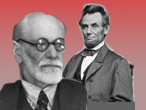Incumbents certainly have important advantages over their challengers. For one, they have name recognition. That means constituents have some kind of relationship with them. It doesn’t matter if they’ve never met. This is similar to the relationship we have with celebrities. We never meet them, but we have a relationship with them. We even cry when they die.
More, incumbents have had at least one term to solidify these relationships with their constituents. They attend church dinners, ball games, whatever.
They also can give a variety of favors to them, like government contracts and inside information about what’s going on in government.
Note, I did not say anything about the job the incumbent did. Though that is generally the focus in an election, it does not decide elections.
None of this is unknown. It takes place at the conscious level. We, or at least most of us, are aware of it. However, there is more, a factor that we are unaware of. It is not a large factor when rendered conscious. Then it can be dealt with by our adult, rational minds, and accepted or discounted.
At the unconscious level, however, the way we see and relate to our leaders has another dimension, a hidden one. We are not aware of it. It is our relationship with our parents.
When we were little, inside the nest, we saw our parents in some common ways. They were all-knowing and all-powerful. They gave, and they withheld. Most important, they took care of us.
As we enter the world, first in school, then work, there are people who also take care of us. Though it is care-taking to a lesser extent, it is care-taking. These people are our teachers and our bosses. Despite all the aspects of our relationships with them, whether we love them, hate them, admire or detest them, the relationship with them resonates unconsciously with the relationship we had with our parents.
This is also true of our political leaders, incumbents. Whether we like them or not, admire them or not, vote for them or not, they are, to an extent we are unaware of, like our parents.
So, unless a challenger is able to overcome this advantage incumbents have, he or she will not get us to reject them. After all, it would be like rejecting our parents.
The successful challenger generally addresses this problem intuitively. However, intuition is not always reliable. Rather, if the challenger takes this relationship into consideration, whether in phraseology or embedded comments addressing it, he or she leaves the incumbent with an important edge.

 Can you immagine how the political ideas and aspirations envisioned by Abraham Lincoln and the exploration of the psychological mind explored by Sigmund Freud can be seen as one entity?
Can you immagine how the political ideas and aspirations envisioned by Abraham Lincoln and the exploration of the psychological mind explored by Sigmund Freud can be seen as one entity?